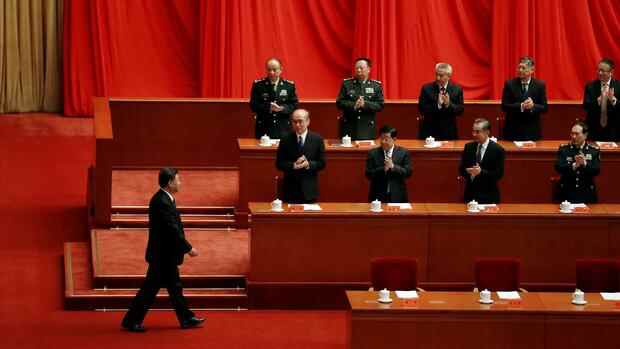The President is facing a third term. Before him, only Mao could do it.
(Photo: Reuters)
Dusseldorf The Chinese Communist Party paved the way for party and state leader Xi Jinping’s third term on Thursday. In a “historic resolution” at the end of its four-day plenary session in Beijing, the Central Committee decided on Thursday that it was necessary to “persistently” uphold the position of Xi Jinping “as the core of the party”.
Experts believe that this has approved Xi’s plans for a third term or even beyond. The associated party congress is scheduled to take place in the second half of 2022. It would be the first time since Mao Zedong that a party leader can remain in office for more than two five-year terms.
From Monday to Thursday, the almost 400 highest-ranking cadres of the Communist Party met in Beijing for a plenary session. It was only for the third time in the 100-year history of the Communist Party, after 1945 and 1981, that a so-called historical resolution was passed. In it the party celebrates its previous achievements and shows the future way.
“The historical resolution is intended to officially initiate a new phase in the development of ‘socialism with Chinese characteristics’ for the 21st century, in explicit contrast to Western models of order”, says Sebastian Heilmann, Professor of Politics and Economics in China at the University of Trier. “It’s about a new regulatory policy, more control and more ideology.”
Top jobs of the day
Find the best jobs now and
be notified by email.
The key is how China can reach a new level in economic and social development. Due to the leaps in growth and technology in recent years, Xi Jinping sees the prerequisites for shaping a socialist society for the 21st century that is superior to the western market-based democracies. The resolution then also speaks of the “superiority of the socialist, political system with Chinese influences”. Only socialism can save China.
More control, ideology and nationalism
The resolution also underpins Xi Jinping’s claim to leadership ideologically and is intended to show the country the way for decades. The Central Committee called on “the entire party, the entire army and people of all ethnic groups to rally even more closely around the Central Committee with Xi Jinping at its core.” The resolution also formally abolishes the old principle of “collective leadership” in favor of a return to the “leadership cult”, as diplomats believe.
“He is preparing the re-election of Xi Jinping and giving him absolute authority,” said ex-politics professor Wu Qiang of the German press agency. With this “democratic centralism”, so the official description, the professor sees the party move even further into the nationalist corner.
The “shift to the right” also had an impact on other countries. Wu Qiang, who was dismissed from Tsinghua University for his criticism, warned of an “unpredictable challenge” for China’s neighbors and the international order in the western Pacific. “Outwardly, nationalism will show more blindness and irrationality.”
The so-called “historical resolutions” marked turning points in the history of the Communist Party and the People’s Republic. With such a document, Mao Zedong consolidated his position four years before the founding of the People’s Republic in 1949. It attested that only the revolutionary followed the “correct political line”.
After Deng Xiaoping’s death in 1981, such a resolution put an end to the chaos of Mao rule and laid the foundation for reform and opening-up policy. It enabled China to rise to become the second largest economy in the world. The new resolution puts Xi on a par with Mao and Deng.
As a rule, seven plenary sessions are held between the major party congresses. While the fifth plenary normally approves the five-year plans, the sixth plenary deals with ideology and the future direction of the Communist Party.
With agency material
More: Xi Jinping starts Operation Preservation of Power – It’s getting more and more uncomfortable for companies in China
